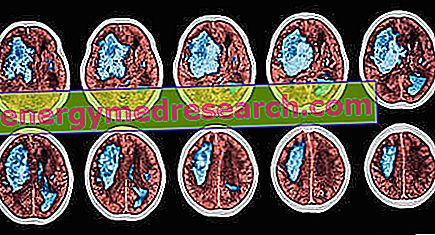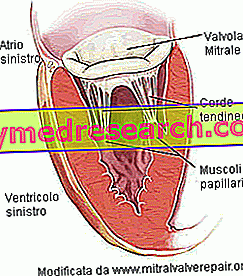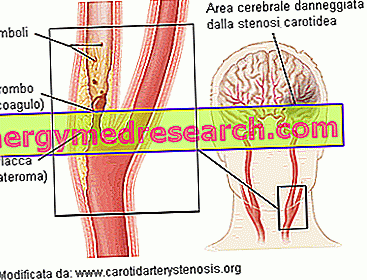Generality The term stroke and its numerous synonyms ( stroke, apoplectic attack , cerebral infarction, stroke, etc.) indicate a loss of brain function, caused by insufficient blood supply to a more or less extensive area of the organ. Figure: the image emphasizes the importance of immediate intervention of medical aid in the presence of the typical symptoms of stroke. Fr
Category cardiovascular diseases
Generality The term stroke and its numerous synonyms ( stroke, apoplectic attack , cerebral infarction, stroke, etc.) indicate a loss of brain function, caused by insufficient blood supply to a more or less extensive area of the organ. Figure: the image emphasizes the importance of immediate intervention of medical aid in the presence of the typical symptoms of stroke. Fr
Generality Hemorrhagic stroke is a type of stroke. At its origin there is the rupture of one or more blood vessels present in the brain, which results in a leak of blood (hemorrhage). The main causes of hemorrhagic stroke are: rupture of a cerebral aneurysm, head traumas, chronic hypertension and congenital arteriovenous malformations with encephalic site
Generality Mitral insufficiency (or mitral regurgitation ) consists of the incomplete closure of the left atrioventricular orifice, in which the mitral valve (or mitral valve) resides; this happens during the phase of ventricular systole, that is, in the moment of contraction of the ventricles of the heart; under similar conditions, finding the orifice not completely closed due to valvular incontinence, the blood returns partially backwards, passing from the left ventricle to the left atrium: it is the so-called mitral regurgitation
Curated by Sebastiano Sessa Metabolic syndrome is a frequent disorder, affecting overweight people when there is an increase in abdominal circumference, blood sugar, triglycerides and blood pressure. The metabolic syndrome is triggered when the fat accumulates not in the buttocks but in the abdominals, triggering - as I introduced - the metabolic syndrome
Generality Metabolic syndrome is a clinical condition that deserves special attention due to its severity and spread. This term does not indicate a single pathology but a set of predisposing factors which, joined together, place the subject in a high risk range for diseases such as diabetes, cardiovascular problems in general and steatosis in the liver (fatty liver)
Generality Carotid stenosis is a disease that affects the carotid arterial system. The term stenosis, in this case, indicates a reduction in the vessel size, due to which the blood flow downstream of the narrowing is decreased; it follows a state of suffering of the organs reached by it, due to lack of oxygen and nutrients carried by the blood
Hypoglyceridemia is the medical term used to indicate low levels of triglycerides in the blood. The values considered normal fluctuate indicatively between 40 and 170 mg / dL, as shown in the table. Triglyceridemia and cardiovascular risk mg / dL mmol / L Interpretation <150 <1.7 Desirable values 150-199 1.7-2
See also: venous thrombosis - arterial thrombosis Thrombophilia is the tendency to develop thrombi. The opposite condition, namely the tendency to bleed, is called hemophilia. The thrombophilic patient presents a greater risk of suffering cardiovascular events related to the formation of abnormal clots (thrombi) in the arterial or venous circulation
See also: venous thrombosis - Coumadin The term trombo [from thrombos = lump] indicates the presence of a blood clot that adheres to the undamaged walls of the vessels, whether they are arterial, venous, capillary or coronary (which provide blood circulation to the heart). The presence of a thrombus is a potentially serious condition, since if it reaches significant dimensions it can obstruct the lumen of the vessel and block its flow
Prefer plant-based foods, rich in fiber, vitamins, antioxidants and mineral salts. Limit the consumption of animal fats (butter, lard, lard, cheese and fatty meat) and avoid margarine. Preferably consume vegetable oils, especially olive oil, but avoid certain types of vegetable oils such as rapeseed oil and limit the use of "tropical" ones (coconut oil and especially palm oil)







